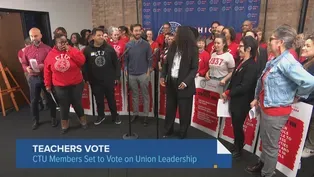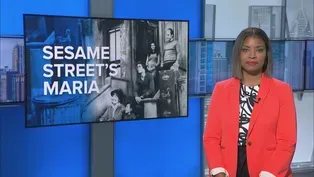
Report Examines How Undocumented Health Care Programs Impact Hospital Debt
Clip: 5/15/2025 | 8m 2sVideo has Closed Captions
Illinois is on track to shut down a health care program that covers undocumented immigrants.
State officials are on track to shut down a program at the end of June that provides publicly funded health care coverage to more than 30,000 non-U.S. citizens in Illinois, including many who are in the country without legal authorization.
Problems with Closed Captions? Closed Captioning Feedback
Problems with Closed Captions? Closed Captioning Feedback
Chicago Tonight is a local public television program presented by WTTW
WTTW video streaming support provided by members and sponsors.

Report Examines How Undocumented Health Care Programs Impact Hospital Debt
Clip: 5/15/2025 | 8m 2sVideo has Closed Captions
State officials are on track to shut down a program at the end of June that provides publicly funded health care coverage to more than 30,000 non-U.S. citizens in Illinois, including many who are in the country without legal authorization.
Problems with Closed Captions? Closed Captioning Feedback
How to Watch Chicago Tonight
Chicago Tonight is available to stream on pbs.org and the free PBS App, available on iPhone, Apple TV, Android TV, Android smartphones, Amazon Fire TV, Amazon Fire Tablet, Roku, Samsung Smart TV, and Vizio.

WTTW News Explains
In this Emmy Award-winning series, WTTW News tackles your questions — big and small — about life in the Chicago area. Our video animations guide you through local government, city history, public utilities and everything in between.Providing Support for PBS.org
Learn Moreabout PBS online sponsorshipsave a program that provides health insurance to immigrants without legal status before the budget season wraps up in Springfield.
More than 32,000 undocumented people ages 40 to 64 currently get coverage from the program.
Health benefits for immigrant adults.
But with the state facing a budget deficit and federal funding uncertainties Governor JB Pritzker cut the program from his proposed spending plan.
Now a new report from the University of Chicago links the program to reduced financial burdens on hospitals.
Joining us on zoom is one of the reports.
Researchers are Ashley Martinez court do so.
A public health professor at the University of Chicago.
Thank you for joining us.
Thank you for having me.
So your research attract programs like health benefits for immigrant adults and their impact on hospital finances in Illinois.
Tell us what you found.
Please.
Yeah, definitely.
>> So we were interested in understanding the economic impacts of the HBA H B, I S programs for the state beyond just the individuals who are enrolled in the program.
So what we did is we look at hospital finances before and after the policies for past and compare hospitals in Illinois to those Wisconsin in Indiana didn't have the policy and we just tracked and you statistical models to look how did hospital finances change?
And was there a significant change that was associated with the timing of the hpa hpi, policies?
We specifically looked at this outcome called uncompensated care, which is essentially when hospitals cover care for patients that isn't compensated to them or paid that to them from patients or insurers.
And so we looked changes in uncompensated care from 2017 to 2020 before the policy was passed and we looked at trends from 2021 to 2023 when the policy was implemented, we see the hospitals in Illinois experience about 15% reduction in one of the outcomes debt.
And we don't see that reduction in our comparison.
States of Wisconsin and Indiana.
think these results are telling us is that there is an association between the passage of these policies, the providing health insurance for individuals who were previously uninsured.
And compensation for hospitals to provide care to parents as well as love doing >> And as mentioned, you know, part of the program are on the chopping block because of the budget uncertainties, the current budget proposal advocates, of course, are pushing to keep it.
So how should you know, hospital hospital administrators, policymakers advocates be looking at your research on what you found.
>> Yeah, that's a great question.
You know, this is a landmark program for the first state in the nation provide this kind of health care coverage that was state funded for immigrants were excluded from federal programs like Medicaid and Medicare.
And this was coming off of the COVID pandemic we understood that taken care of everybody's was benefit for the entire state and that there was a large group Illinois and to have part of our state working essential workers with contributed to our economy, our community, and important to take care of their health.
And there are certainly a lot of there's certainly a lot of costs associated with providing health care.
But what we think is that many of these individuals were uninsured for a really long time.
So they have a lot of Health needs that program had to cover that were quite expensive and there that we believe that 2 of those costs and estimates will serve regular ice over time.
But we know in public how is that providing health insurance can be expensive but long term, it's an important investment in the health the individuals are covered.
A health care system overall, the benefit of the public health benefit to everybody else that benefit to having healthier workforce to help your pocket.
This and our research specifically points to the benefits for hospitals who now get dollars for care that they were already providing to a lot of individuals that they now are being reinforced for integrate more robust health care environment that benefits everybody.
>> So all of that said, though, the office of the Auditor general released an audit of the program in February saying, quote, the initial cost estimates for HB I a for those ages.
42 to 54 for fiscal years 2021.
22 23 totaled 68 million dollars.
While the actual total cost was 262.2 million dollars or 286% higher.
That is a significant amount.
What do you say to lawmakers then who think the program should be cut?
Just because the state can't afford it?
>> I think there's a lot of ways too.
Think about tinkering with the program to make costs more cost efficient.
For example, the state has moved and release to what's called managed care to help.
managed cost.
There's ways we can be more efficient about how we deliver the health care.
What gets covered.
But overall, I think there's a lot of evidence in the health and health care becomes literature that these you kind of say have to spend a little money at the beginning to ensure in the long run.
>> And I think it's important to point out that >> people are going need this health care's regardless of whether the state covers it or somebody else covers it.
>> People are going go to the hospital for.
Diabetes care, for cancer, for strokes, for primary care to have their babies.
>> And so the hospitals before the program incurring the cost of that program.
>> And that got shifted.
Spread out to everybody else.
And with the state covering the program, not only does not relieve the burden on hospitals, but it's some ways a more efficient way to deliver health care because now people are going to go see their primary care physician for their diabetes medication or to get help heart screenings rather than waiting to go to the emergency room in their diabetes blood sugars are out of whack or that had a stroke.
So it is a lot of money I got, you know, I'm a taxpayer.
I live in Illinois.
I think about the cost all of our public investments.
As a researcher, we understand that investing now is going to save us in the long run.
And the last thing I'll add is for this particular age group, this 42 to 64.
That is being that that is part of the program is being caught.
It's important to remember that this is our prime working age population.
And so it's important to keep these folks healthy so they can continue working so they can continue raising their families.
And there's a lot of evidence that shows that when people are uninsured during period of time, that when they become insured, 65, if they are much more expensive for the health care system.
And so if we can to keep people healthy insured, it's going to state our state in the long run.
again, I think this to well, it's OK, we've got just a couple of seconds left addition.
I wanted to before we let you go, this research is still ongoing.
What's next?
>> Yeah, we are living our models in our analysis of the ways that we can to make sure that our findings are robust.
There's a lot of things that could be going on.
One of the other things we find is that it's counties that have the highest level of program enrollment that see the largest effects.
We think it really is the program that is doing something.
But we're checking all sorts of And then we're also going to look at emergency room and hospitalization utilization among the period of time in these programs are passed again to think about is are the programs helping provide more efficient forms of health care, such as primary care rather than expensive hospitalizations and emergency rooms.
And important California now they're considering their own programs.
So we've led the nation.
And I think it's important for us to think about.
I'm not only more research to come.
It sounds like Apple.
>> We'll absolutely be on the lookout for that.
We'll have
CTU Members Set to Vote on Union Leadership
Video has Closed Captions
Clip: 5/15/2025 | 3m 40s | The Chicago Teachers Union is holding officer elections. (3m 40s)
Sonia Manzano on 'Sesame Street,' Early Childhood Education
Video has Closed Captions
Clip: 5/15/2025 | 8m 14s | Sonia Manzano played Maria on "Sesame Street" for more than four decades. (8m 14s)
Providing Support for PBS.org
Learn Moreabout PBS online sponsorshipSupport for PBS provided by:
Chicago Tonight is a local public television program presented by WTTW
WTTW video streaming support provided by members and sponsors.













